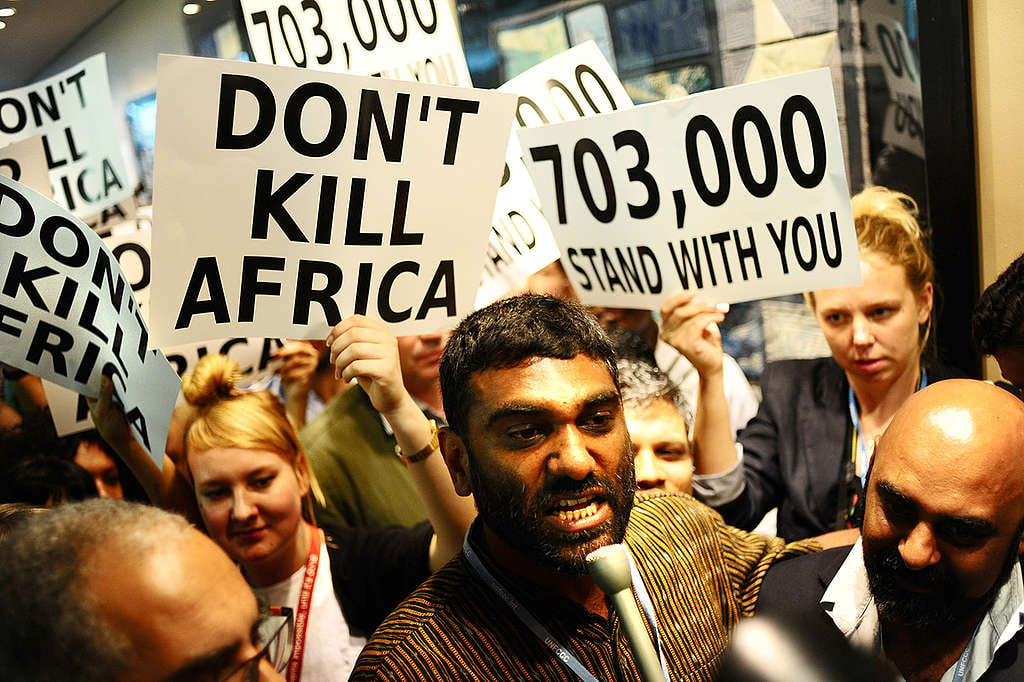The Department of Energy and Mineral Resources (DEMR) announced Karpowership as one of the eight preferred bidders for the procurement of emergency electricity for bid-window five. Karpowership, a Turkish Karadeniz Energy Group, will supply South Africa with five power ships between 2022 and 2042, costing taxpayers R218 billion. They have received favour from the government by being granted numerous exemptions, threatening to make inroads on commitments made to reduce South Africa’s greenhouse gas (GHG) emissions. It begs the question: is state capture afoot?
In the article Renewable energy offers escape from crippling joblessness, published on BusinessLive, Greenpeace Africa argued the case for renewable energy as a potential source of immediate and decent job creation for South African youth, who face mounting unemployment burden. In the first quarter of 2021, youth unemployment reached a shocking 61.3%. The article cited the decline in public infrastructure as a potential contributor to this reality. Public infrastructure has been in rapid decline since 2016, falling from R251 billion in 2018 to R231 billion in 2019. R15 million of this reduction was accounted to Eskom’s budget cut, the power utility infamous for delaying necessary plant upgrades, leading us to the energy crisis in which South Africa finds itself.
While the cost of procuring electricity from Karpowership may be relatively cheaper in the short term, in the long term, the South African government risks robbing South Africans desperate to join the workforce of job opportunities. These power ships are complex engineering projects that will be assembled off-site and delivered fully equipped. The project will most likely require high-skilled labour sources from abroad. Further, Karpowership obtained exemption from the Department of Trade, Industry and Competitions (DTIC) to comply with the local-content stipulation, requiring 40% of the goods and services associated with this project to be locally sourced, a decision which could have potentially empowered our local manufacturing industry. Throughout the supply chain, this project will benefit foreign-owned companies; this is legitimised capital flight. For a government that talks a big game about radical economic transformation (RET), this is quite the opposite. In addition to this, the five proposed power ships will be positioned in special economic zones, making them eligible for tax exemption. It seems Karpowership and their associates stand to benefit more from this than South Africans.
In the months since the announcement of Karpowership as a preferred bidder, a competing bidder has has appealed to the Pretoria High Court to contest the tender process, citing that the tender process for procurement of energy for bid window five was “grossly and blatantly flawed corrupt and procedurally unfair,” with decision made that favoured Karpowership. Given reports that Karpowership has been accused of paying a bribe to the Lebanese Ministry of Energy for the renewal of its contract, claims of corruption cannot be ignored.
Energy expert Chris Yelland stated that the government’s decision to secure double the maximum recommended tenure for these ships demonstrates how dire our electricity crisis is. Still, it also illustrates how myopic our government is in its vision and that they do not foresee rectifying this crisis for the next 20 years and are applying a short-term solution to a long-term problem, all the while creating environmental, economic and social damage along the way. Upscaling renewable energy and investing in battery storage could offer the national grid the reprieve it requires while strengthening local manufacturing capacity.
The proposed locations for the power ships, Richards Bay, Coega and Saldanha Bay, are world-renowned for their scenic beauty and abundant marine life. The decision to position these ships here threatens the communities’ livelihood and survival through small-scale fishing and ecotourism. The project threatens these communities’ quality of life through air pollution, water pollution, and contributing to climate change; the procurement of Liquified Natural Gas (LNG) for 20 years will lock us into a high emissions trajectory for well into 2040, an issue they gave little, to no consideration in their scoping report. Karpowership tried and succeeded in gaining exemption from complying with the environmental impact assessment process before Minister Barbra Creecy revoked their exemption. They had not provided sufficient reasons for exemption.
Looking at the process which government officials have disregarded, it becomes clear that the government has a vested interest beyond stabilising our energy market for why they want this project to proceed. The maladministration involved with Karpowership may rival the arms deal. This deal will empower the select few, while South Africa’s youth are left clamouring for scraps. South Africa has barely begun to tap into its renewable energy potential, where solutions and decent jobs await.
Greenpeace Africa demands:
- Minister Gwede Mantashe to reconsider the procurement of LNG from Karpower.
- Minister Gwede Mantashe to revise the Integrated Energy Plan to include more renewable energy.
- Parliament to launch an investigation into the awarding of the exemptions and tenders to Karpowership.
- The Zondo commission to investigate the potential of state capture in the granting of the Karpowership exemptions.
- Minister Barbra Creecy to report transparently on the implications of this project on GHG emission inventory.
Published on Fin24
 Get Involved
Get Involved
